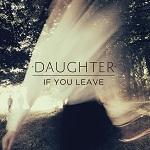
Daughter If You Leave
(4AD/Glassnote)
If you’re like me, you have a good number of Cure albums in your music library. If you’re even more like me, you also set your viewing preference to “albums” so you get to see all of the pretty covers as you scroll down and amaze your friends with your vast collection of (entirely legal) music. Well, in my case, nothing comes between The Cure and Daughter, and I often can’t find If You Leave because it fits in so well. Just look at that album art and then think about Seventeen Seconds,Pornography, or Disintegration. This album fits right in!
If You Leave is one of the doomiest, gloomiest albums since Robert Smith’s heyday. Just look at the song titles! When you see Winter and Smother at the start, you know that Humans, Lifeforms, and Tomorrow aren’t going to lean toward the cheery associations. If You Leave doesn’t have the aggressive edge of Pornography or the expanse of Disintegration, but it does utilize the same kind of elemental and light/dark imagery. The first lyrics of Winter invoke the image of sheets of ice, and then contrasts it with flames in its next vers;, Smother relies on metaphors of darkness and trees; and Youth, one of the album’s best songs, repeats the lyric “setting fire to ourselves for fun”, while returning to the motif of darkness and silhouettes. This is a dark album that sounds better the colder, the rainier, the darker it is.
If You Leave, like The Cure, also relies heavily on an airy, full production that asks you to play the album loud and let the rich atmosphere wash over you. But musically, Daughter are much closer to Sigur Ros, albeit a bit smaller. Elena Tonra’s voice has the same natural beauty of Jónsi’s, but Tonra’s is most haunting at a lower vocal range. Remi Aguilella, meanwhile, attacks the drums on the choruses to give every song a much heavier, fuller scope. Meanwhile, Igor Haefeli’s guitar lines create immediately captivating intros and fill up any kind of negative space. The result is quite beautiful, every song pouring out into space and leading up to climactic and revelatory bridges. Lifeforms, for example, begins with a soft but upbeat bassline and builds, through Tonra’s powerful and claustrophobic, bodily imagery—“you always find another womb to grow,” “you can try to sink down deeply/and find children lost at sea/find the children who discretely be killed in infancy” builds eventually to louder and more urgent instrumental passages, Tonra’s voice sinks into the background, and suddenly the song resembles the cry for help that the subject must be thinking. When everything calms down for the final verse, a loss pervades, and the song, like all the others, ends with a barely-optimistic lyric that is contextually hopeless.
Despite the formula, If You Leave works. Songs will run together and the same couple song structures repeat throughout the album, similar images crop up repeatedly, but a lack of variety never so much as threatens to overpower the great songwriting. Instead, the problem is precisely how calculated the emotions feel. Daughter doesn’t let their songs develop naturally the way that Sigur Ros does, they don’t have the creativity of someone like Bjork—who, despite sounding worlds apart, seems to exhibit an uncanny influence in texture and lyrics—and they don’t yet take enough risks. Human is a nice change of pace with its immediate drumbeats and acoustic guitar, but by the time it reaches the chorus, the subject matter feels a bit repetitive, even if the repeated insistence on humanity, “underneath the skin there’s a human/buried deep within there’s a human/and despite everything I’m still human/but I think I’m dying here” can’t help but conjure up a sympathetic jolt.
What emerges is a fascinating, infinitely bleak break-up album, but one without the scope of Disintegration or the raw, intellectual power of Blood on the Tracks. Instead, If You Leave perhaps has more in common with For Emma, Forever Ago, but if the rock star Vernon of Bon Iver’s recent tour had decided not to be so sparse. That means that Daughter have crafted a resonant album, but one that demands to be taken for slightly more than it has to offer. It’s too neat a portrait of heartbreak, too narrow a look at complicated subject matter, and it hasn’t yet transcended its (many) influences) Still, it’s a captivating listen, and sometimes, particularly in the time that If You Leave depicts, that’s all you need. The album’s last track is its best and its longest, and that’s reason enough to push “play” again.
6 May, 2013 - 04:17 — Forrest Cardamenis